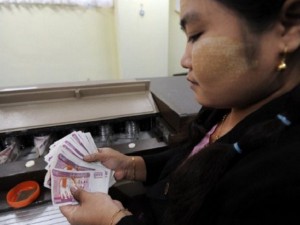Myanmar central bank eyes independence – Interview

This picture taken on June 27, 2012 shows a Myanmar employee handling bank notes at the central bank of Myanmar in Yangon. Myanmar's central bank is poised to win independence to set monetary policy, its deputy governor said, in what would be a major economic reform by a government seeking to attract foreign investors. AFP/SOE THAN WIN
YANGON—Myanmar’s central bank is poised to win independence to set monetary policy, its deputy governor said, in what would be a major economic reform by a government seeking to attract foreign investors.
“If we have monetary stability, investors can be encouraged to enter the country with greater confidence,” Maung Maung Win told AFP in an interview.
An independent central bank is seen as a hallmark of a modern free-market economy.
The move is not expected to come overnight, however, and the Central Bank of Myanmar (CBM) needs to recruit more staff to expand its capacity, Maung Maung Win said.
A new draft of the central bank law is now with the Attorney General’s Office waiting to be reviewed, and must pass parliament before the institution can break free from government control over monetary policy.
Article continues after this advertisement“The CBM law would be amended to become more relevant for a system of an independent central bank,” said Maung Maung Win, one of two CBM deputies.
Article continues after this advertisementThe CBM is seeking overseas help to train its staff. Earlier this month it signed a memorandum of understanding with Thailand’s central bank on technical cooperation.
“The status of independence could not be given immediately as the bank needs to meet the requirements, including infrastructure, to become independent,” said Maung Maung Win.
In a report published in May, the International Monetary Fund noted that the CBM is a department within the finance ministry and “does not have a monetary policy framework”.
It added: “The CBM should be given full operational autonomy and proper accountability, with the clearly defined primary objective of domestic price stability.”
According to the CBM’s website, the main objective of its monetary policy is “to maintain macroeconomic stability in the economy while promoting domestic savings.” using interest rates as its main instrument.
The Central Bank Rate currently stands at 10 percent.
Myanmar’s reformist President Thein Sein this month vowed to put the economy at the center of his next wave of reforms, following a series of dramatic political changes.
In the new government’s most radical economic reform yet, the country in April began a managed flotation of its currency, overhauling a complex foreign exchange system in a bid to facilitate trade and investment.